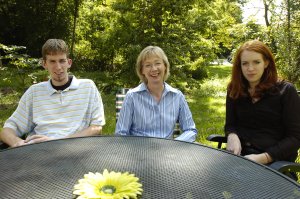‘Get Off my Back’ helps children with ADHD
By DANIELLE LYNCH
WEST CHESTER — Teenagers diagnosed with Attention-Deficit/Hyperactivity Disorder, a neurobehavioral disorder, can find support in groups such as “Get Off my Back”.
ADHD “is characterized by developmentally inappropriate impulsivity, inattention, and in some cases, hyperactivity,” according to the Children and Adults with Attention-Deficit/Hyperactivity Disorder nonprofit organization, also known as CHADD.
Clinical psychologist Ari Tuckman facilitates “Get Off my Back” meetings once a month for a group of teenagers between the ages of 13 and 18 as part of programs offered by the local chapter of CHADD.
“It’s an opportunity for kids to meet others with ADHD,” said Tuckman.
In 2006, there were an estimated 4.5 million school-aged children (5 to 17 years of age) that had ever been diagnosed with ADHD, according to a July 2008 Vital and Health Statistics report released from the U.S. Department of Health and Human Services Centers for Disease Control and Prevention.
Tuckman said that “Get Off my Back” allows children to form connections and normalizes their experiences by allowing them to meet others facing the same challenges.
Children with ADHD often have trouble in school with not being able to pay attention and handle homework, according to Tuckman. ADHD students also have issues with interrupting and forgetfulness, he said.
Another area that ADHD children struggle with is family relationships. Because these children tend to need more direction and oversight from parents, this can lead to more arguments at home, according to Tuckman.
Overall, there are three different types of ADHD, Tuckman said. The first is the inattentive type which is characterized as the child being distracted, forgetful and disorganized. Secondly, there is the hyperactive impulsive type which tends to have more issues with restlessness and interrupting, Tuckman said. The last type of ADHD is a combined type of inattentiveness and hyperactive impulsiveness, he said.
Over time, the hyperactive symptoms tend to settle down, and when the teenager becomes an adult, he or she is inattentive which can be more problematic because that person may have greater demands, Tuckman said.
 West Chester resident Marie Paxson, president of CHADD and past coordinator of the local chapter, said this organization provides support to ADHD teenagers and their parents as well as adults who suffer from this disorder. West Chester resident Marie Paxson, president of CHADD and past coordinator of the local chapter, said this organization provides support to ADHD teenagers and their parents as well as adults who suffer from this disorder.
According to Paxson, whose two children, Laura and Steven, have ADHD, most people associate the disorder with academic struggles.
“There are certainly issues with processing, remembering facts and struggles with working memory and a compulsive component,” Paxson said. “But a lot of people don’t realize the social struggles.”
Paxson said she believes inclusion for ADHD children is important.
“If given the proper accommodations, they can function at a high level,” Paxson said.
Parents with kids of special needs are at a greater risk of divorce or even greater strain on marital relationship for those who stay together, Tuckman said. In a book review of “Married with Special-Needs Children” by Laura E. Marshak and Fran Pollock Prezant, Tuckman wrote that often “too many marriages collapse under the additional pressure of caring for special-needs children, for lots of different reasons.”
For more information about Ari Tuckman, visit www.TuckmanPsych.com
For more information about CHADD visit http://www.chadd.org/
For additional information about the disorder visit http://www.help4adhd.org/
To contact staff writer Danielle Lynch, send an e-mail to dlynch@dailylocal.com.
|
